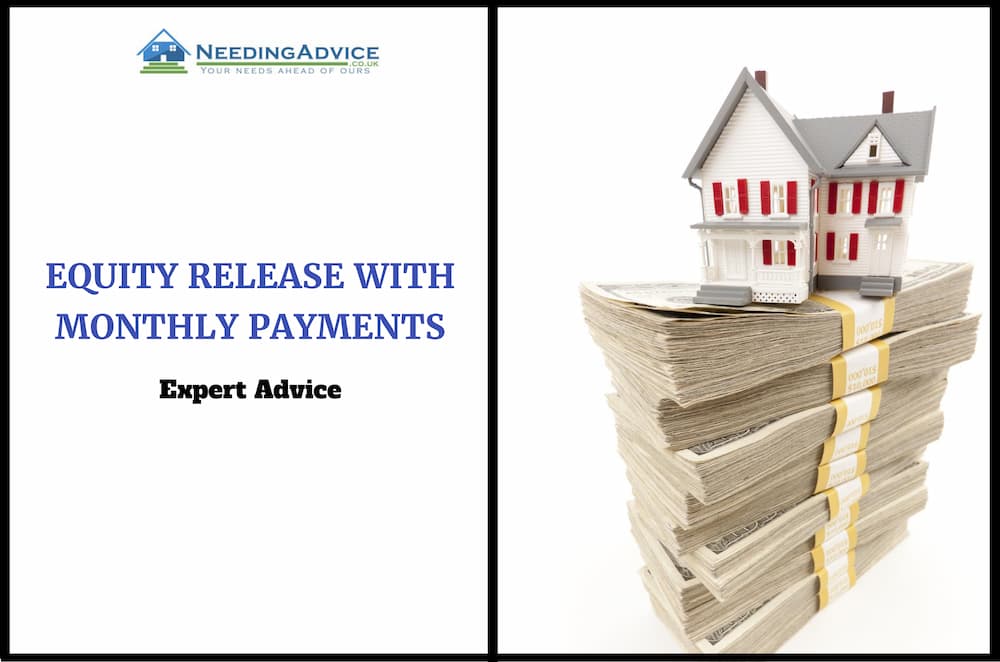Are you looking to enjoy your retirement to the fullest while still maintaining financial stability? Look no further than equityThe difference between the value of the property and the amo... release with monthly payments. This innovative financial solution allows homeowners to access a portion of their property’s value while still receiving regular monthly payments to help cover expenses.
As the population ages and more people look towards making their retirement comfortable, equity release has become a prominent option. Equity release with monthly payments, also known as a lifetime mortgage with monthly repayments, is increasingly popular among retirees who are asset-rich but cash-poor. In this article, we’ll take a detailed look at this option, covering a range of pertinent aspects from the application process to potential impacts on future finances.
Equity release will reduce the value of your estate and can affect your eligibility for means tested benefits
What Is Equity Release?
Equity release allows individuals, typically over a certain age limit, often 55, to unlock the value tied up in their property without the need to move. These individuals can access tax-free funds, either as a cash lump sum or through regular payments, depending on the chosen equity release product. There are two main types of equity release: lifetime mortgages and home reversion plans.
Lifetime Mortgages
A lifetime mortgage is the most common type of equity release scheme. It is a long-term loan secured against the borrower’s property. The loan, plus rolled-up interest, is repaid when the property is sold, usually when the homeowner either dies or moves into long-term care. Key lifetime mortgages include:
- Lump Sum Lifetime Mortgages: Where a single lump sum is taken, with interest accruing over time.
- Drawdown Lifetime Mortgages: Allows the borrower to take amounts over time, giving control over how much interest accrues.
- Interest-Only Lifetime Mortgages: Borrowers can make monthly interest payments, reducing the impact on the amount left for inheritance.
- Repayment Lifetime Mortgages: Allows the homeowner to make voluntary repayments of capital and/or interest.
Home Reversion Plans – by referral only
A home reversion plan is another type of equity release scheme. This plan allows the homeowner to sell all or part of their property in exchange for a lump sum or regular payments. The homeowner retains the right to continue living in the property until they die, after which the reversion provider will take ownership of the house and sell it to recover its investment.
Professional and Financial Advice
Before deciding on an equity release plan, seeking professional advice from an equity release adviser is essential. The adviser, on completionThe point at which a property purchase is finalized and owne... of an affordability assessment and an in-depth discussion about your financial goals and anticipated retirement income, may charge an advice fee. This consultation ensures that all alternatives to equity release have been considered and that the product aligns with the applicant’s criteria and doesn’t affect means-tested benefits like Pension Credit or Universal CreditA government benefit that replaces several other benefits, i....
Regulatory Requirements and Legal Advice
Equity release providers are regulated by the Financial Conduct Authority, ensuring they adhere to stringent rules that protect consumers. It is a regulatory requirement to receive advice from a qualified financial adviser before completing an equity release application process. Solicitor fees will apply as it is also a requirement to seek legal advice before entering a binding agreement for equity release.
Eligibility Criteria
Eligibility for equity release typically includes a minimum age requirement (usually 55), a minimum property value, and additional criteria related to the property’s condition and location. Your equity release adviser will run an affordability check and review these against the criteria of potential lenders.
The Application Process
Once you’ve received advice about matters related to equity release and have decided to proceed, your adviser will complete the equity release application on your behalf. Application fees may apply, and the application outcomes depend on property valuation and legal work. Joint applications are possible if you are applying with a spouse or partner.
The Costs Involved
Alongside solicitor fees and the advice fee, there might be arrangement fees charged by the lender, and potentially a broker matching service fee if you were introduced to your adviser through a third party. It is also important to consider the long-term impact of releasing equity, including the impact on inheritance and potential increases over time in the loan balance due to rolled-up interest.
Alternative Options and Considerations
For some, downsizing to a smaller, alternative property or a buy-to-let property, can be a more appealing option. This could potentially release a capital lump sum without the need for a loan. It’s crucial to also consider potential capital gains tax implications in such scenarios.
Other options to consider, aside from downsizing, include savings management and investments. Researching where best to allocate existing savings is important as some of the more traditional investments, such as ISAs and stocks & shares, may be more tax efficient than equity release plans. Additionally, considering alternative retirement income sources such as rental income from a holiday let or pension drawdown schemes can provide a steady source of income.
The Impact of Future Care Costs
Equity release can affect your ability to pay for future care costs. The money received from equity release might push your capital above the threshold for means-tested benefits, affecting eligibility for local authority assistance with care costs.
Conclusion
Equity release with monthly payments can be a useful solution for those looking to supplement their annual income in retirement. It allows homeowners to unlock the value in their property, while potentially staying in their home for life. However, it is a decision that needs thorough consideration and professional advice due to the potential impact on your future financial situation and estate. As with any financial decision, especially one as significant as this, it is recommended to seek expert advice, assess the potential long-term impact, and carefully weigh all the alternatives available with respect to your unique circumstances.








Leave A Comment